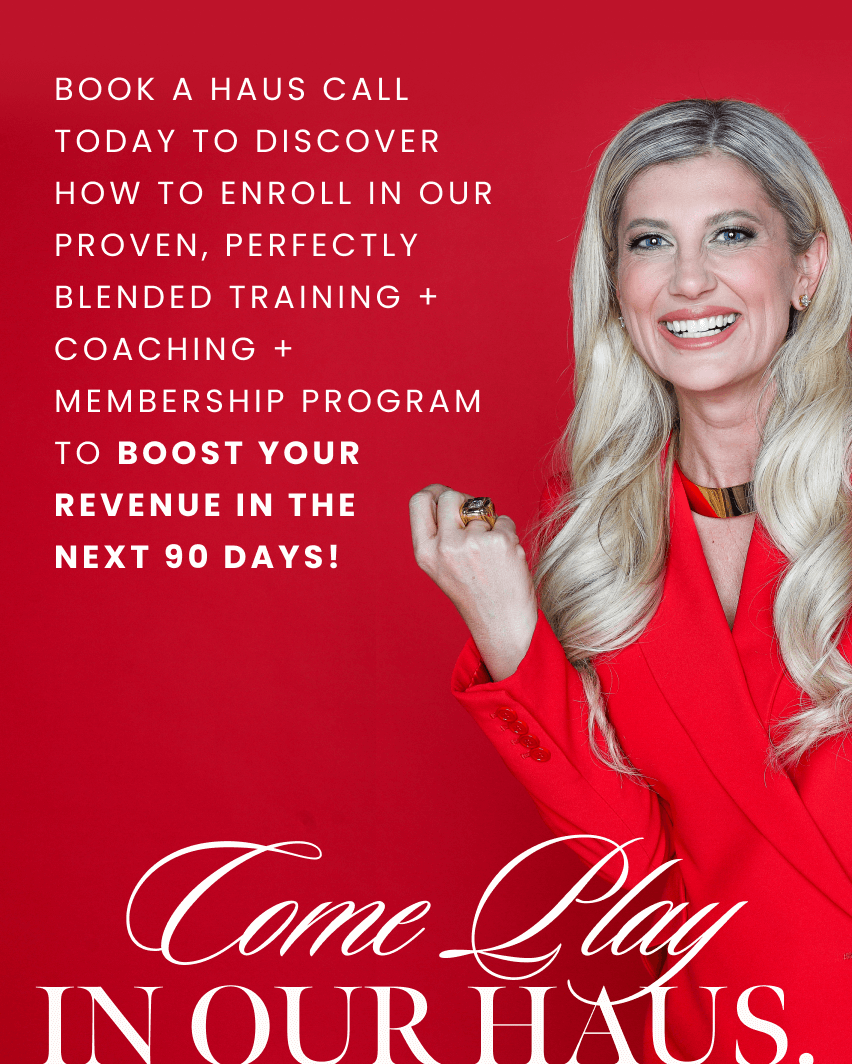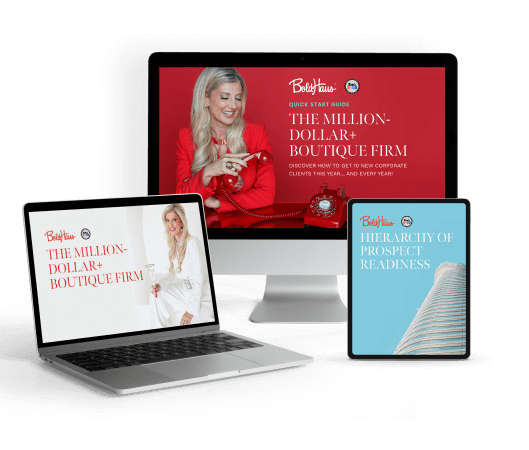(No Cold-Calling Required!)
It means you and you alone are responsible for bringing in revenue.
And it all starts with finding your first client.
We recently shared three strategies on how to win your first corporate client.
Now here are three more practical, simple strategies to get your first consulting client.
1. Pitch Your Current Employer
A tried-and-true path that many consultants, executive coaches, corporate trainers and other self-employed experts have followed is walking out of their full-time job with their first client already in hand: their current employer.
In fact, this was a strategy I sort of used when I left my corporate decision-maker role way back in 2006.
I actually started with a different client first (see: strategy #2) to make sure that I really wanted to start my own consulting business before I turned in my resignation notice.
Then, when that first client project went well and they wanted to hire me again, I marched into my boss’ office to let him know I was resigning — but that I would love to take the company on as a client.
My boss agreed, which meant I walked out of the door with multi-six-figures in my pipeline.

If you’re in a job right now and you think this might be the strategy for you, there are a few things you want to keep in mind.
- Read your company’s HR manual cover to cover to find out what the rules are about employees starting their own business.
- Look for work-for-hire policies, which give your employer ownership over any work product you create.
- Talk to your own attorney to understand how your company’s work-for-hire policy applies to you setting up your own business.
- Look for any rules that say you can’t set up a business entity (i.e. an LLC, S-Corp, etc.) on the side without first notifying your employer and securing permission from HR.
- Watch out for any policy that requires a grace period of six to 12 months before a former employee can become a consultant, vendor, supplier or service provider to the company.
- Bottom line: Every company is different, so you have to read the policies carefully.
Something else to know is that your current employer will initially see you through whatever lens with which they see you now.
For example, rightly or wrongly, your current salary level will serve as a pricing anchor for them, in terms of what they’re willing to pay you.
However, with patience, clear communication, the right mindset shifts on your part, and setting clear boundaries, you can shift their perception in about six months.
And given the current war for talent, if you’re good at what you do, there’s an excellent chance your employer will jump at the chance to keep benefiting from your brain — even if that means working with you in a consultancy relationship.
In fact, many companies, such as Unilever, are already reimagining what an employee life cycle should look like in today’s world.
And we’ve been in a number of closed-door discussions with big brands that are looking at how they can create a better path for employees who want to become entrepreneurs.
2. Reach Out to Your Personal Connections
Another simple strategy to get your first consulting client or first executive coaching client is to leverage your personal connections.
You may not feel you know very many people — or at least not many people who would be an ideal target client for you.
This is a worry we hear a lot from consultants, coaches and other self-employed experts when they first come to work with us at BoldHaus in one of our proven consulting or training programs.
But with a little bit of prodding, 100 percent of our clients have come to realize they know more people than they first thought.
Here are some of the people you want to include in your outreach:
- Personal friends
- Family members — including extended family members
- Co-workers and bosses from all of your past jobs
- Vendors, suppliers, service providers, and outside consultants that you interacted with with while you were employed at a company
- Neighbors
- People who are in sports or social clubs with you
- People you know through your place of worship
- People you know through non-profits where you volunteer
- Parents you know through your kids’ school, sports or other extracurricular activities
- Business owners and entrepreneurs you’ve met through events, masterminds and networking groups
- People you went to college with, both undergraduate and graduate
Once you have this list created, it’s time to do your outreach.

The best kind of outreach is done in person or via the phone.
The second best outreach is Email.
The goal of the outreach is to start educating everyone you know about the problem you solve for organizations.
Here’s what this might sound like in an email. But the same breezy tone goes for a conversation as well.
Darius, It was great seeing you at the game Friday night.
It dawned on me you might not know that I’ve started a coaching firm that helps companies that are struggling with employee back-stabbing, bullying and cliques.
If you ever hear anyone complaining about all the drama going on in their office, would you be so kind as to keep me in mind?
Warmly,
Maggie
OR…
Emi, congrats on your new role at Acme Corp.
I’m sure you’ve got better things to do than keep track of your past co-workers on LinkedIn. 😉
So I thought I’d reach out and let you know I’ve started a consulting firm that helps consumer brands shorten the time it takes to develop new products by 10%. (I know you’re not in product development — so suffice it to say, that’s a lot!)
If you ever bump into anyone who is in Product Research & Development, Product Innovation, or Product Marketing, would you be so kind as to pass my name along? I’d be forever grateful.
And please let me know if I can return the favor in any way.
Warmly,
Kevin
Now, you’re probably thinking, but Angelique, surely there is more to getting corporate clients than that.
And yes, of course there is!
As you grow beyond your first consulting client, if you want to create a predictable pipeline of clients, you’ll need a complete, proven end-to-end business development framework, like the one we provide our BoldHaus Collective clients.
But your first client will likely be someone you know or through word of mouth.
In fact, this approach is what led to my very first consulting client. And after having worked with thousands of consultants in more than 72 countries around the world, I can tell you this is what has worked for A LOT of people who were starting a consulting company.
Also, keep in mind that the above emails are also designed to find out if there are any opportunities with the person receiving the email, but without coming across sales-y.
And the fact is, if you feel weird about sending the email, you’re probably not going to do it. So get your feet wet with something breezy.
3. Host an Executive Roundtable, Virtual Executive Roundtable, Power Breakfast, Power Lunch or Executive Briefing
Here at BoldHaus, we have an expression we’ve borrowed from Tony Robbins. (At least we think he coined it — but who knows.)
And that is: Proximity is Power!
[bctt tweet=”For getting consulting and coaching clients, proximity is power. @AngeliqueRewers” username=”AngeliqueRewers”]
Did you know that upward of 80 percent of all the income that consultants, executive coaches, corporate trainers and other expert service providers make has at least one face-to-face touch point?
Even in this online era, there’s nothing that beats the power of being face to face with people.
Yes, it speeds up the know-like-trust factor.
But more importantly, face-to-face marketing builds credibility and rapport — and allow you to get immediate, real-time feedback.
You will know real fast if you are boring someone to death if they are sitting across the table from you.
Not only that, but hosting a small event allows you to:
- Build the business case for why organizations need to solve whatever problem it is that you solve.
- Create the right gap so that they see why they need you and the services or expertise you offer.
- Educate your potential clients on the best way to solve their problem.
- Lay out the best possible journey for them to work with you.

Plus, here’s the best reason of all to host a small event like this.
It gives you something tangible to use in asking for strategic introductions to second-degree connections.
Stick with me here.
Did you know that The New York Times once published a study from Columbia University, which found that the average American knows 600 people?
Well, here’s the thing.
If you know about 600 people, and every one of those people knows about 600 people, then that means you have about 360,000 second-degree connections in your orbit.
Really let that sink in.
Now, are they all ideal prospects for you? Obviously not.
But there’s no question you’re just one degree of separation away from ideal clients for your new consulting business.
The next problem, however, is how do you get your personal connections to make an introduction for you? Most people don’t like to make introductions because they don’t want to subject their friend or colleague to a sales pitch. You can relate, yes?
But what if the reason you were reaching out and asking for the introduction was because you were hosting an invitation-only executive briefing or an executive roundtable for a certain type of decision maker — and only for people who were recommended to attend?
Now all of a sudden the person who you are asking to make the strategic introduction for you has this great gift to offer their friend or colleague.
This strategy is so effective it’s one of the reasons we teach it thoroughly in our client programs.
When you use these three strategies and keep following up, you will get your first corporate consulting client a lot faster than might feel possible right now.
We are rooting for you! And remember, you can always reach out to us to schedule a call with one of our highly trained business advisors via BoldHaus.com.
Whether you’re still in the starting gate or you’ve been a consultant, coach or corporate supplier for decades, we have resources and programs to support you.





